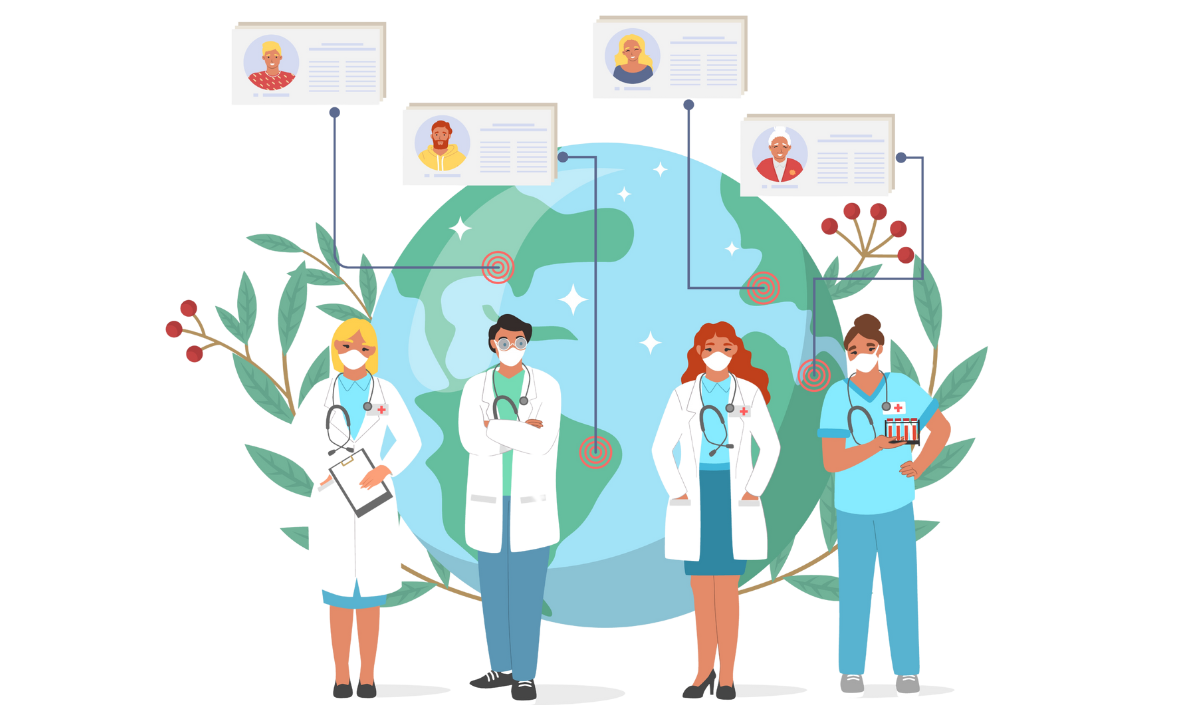This Course Structure is Curated as per the NEP-2020 Guidelines
Course Overview
The BPH Bachelor of Public Health program at Malla Reddy Vishwavidyapeeth, Hyderabad, is an undergraduate degree designed to train students in the core disciplines of public health, preparing them to address community health needs and improve population well-being.
This program focuses on equipping students with theoretical knowledge and practical skills from the first semester. The curriculum covers epidemiology, biostatistics, environmental health, social and behavioral sciences, health policy, and management. Students gain practical experience through fieldwork, community health assessments, and internships, preparing them for diverse careers in public health.
Graduates of this program emerge as ‘Skilled professionals in Public Health,’ enabling them to pursue further higher studies & do research in Public Health along with plenty of job opportunities globally.
Job Roles & Progression
| Duration | Roles and Responsibilities | Salary Range |
| 0-3 years | Public Health Assistant, Health Educator, Research Assistant | ₹3,00,000 - ₹5,00,000 per annum |
| 3-5 years | Public Health Officer, Health Program Coordinator, Epidemiologist | ₹5,50,000 - ₹8,00,000 per annum |
| 5-10 years | Public Health Specialist, Health Program Manager, Senior Epidemiologist | ₹8,00,000 - ₹12,00,000 per annum |
| 10+ years | Public Health Director, Program Director, Lead Epidemiologist | ₹12,00,000+ per annum |

Course Details
Description: 4 Years Degree Program
No. of Seats: 40
No. of Credits: 160 minimum & as specified
A pass in 10+2 (Higher Secondary) with a minimum aggregate of 50% or Equivalent cGPA with Physics, Chemistry and Biology or Mathematics from a recognized board
| Semester | Name of the Subject |
| Semester 1 | Introduction to Public Health Human Anatomy & Physiology Principles of Epidemiology Biostatistics I Social and Behavioral Sciences in Public Health Environmental Health I English & Communication Skills |
| Semester 2 | Microbiology for Public Health Health Promotion and Education Biostatistics II Environmental Health II Health Policy and Management Ethics and Legal Aspects in Public Health Introduction to Health Economics Practical: Community Health Assessment by Field Training |
| Semester 3 | Epidemiology of Infectious Diseases Epidemiology of Chronic Diseases Maternal and Child Health Occupational Health Introduction to Health Informatics Practical: Data Analysis in Public Health |
| Semester 4 | Global Public Health Public Health Ethics Research Methodology in Public Health Pharmaceutical & Drug Management Public Health Surveillance Health Program Planning and Evaluation Practical: Program Evaluation Techniques |
| Semester 5 | Health Informatics Disasterand Emergency Preparedness Population Studies & Demography Elective I Practical: Fieldwork in Public Health Settings I |
| Semester 6 | Non-Communicable Disease Epidemiology Urban & Rural Health Issues Health Economics and Financing Elective II Practical: Fieldwork in Public Health Settings II |
| Semester 7 | Health Systems Research, Global Burden of Disease Behavioral Change Communication Elective III Practical: Internship Project I |
| Semester 8 | Thesis/Research Project: Independent research on a public health topics |
|
- Epidemiological Skills: Ability to investigate and analyze disease patterns and outbreaks.
- Biostatistical Skills: Competence in data analysis and interpretation for public health research and practice.
- Health Promotion and Education Skills: Capacity to design and implement effective health promotion programs.
- Environmental Health Knowledge: Understanding of environmental factors impacting public health and strategies for mitigation.
- Use Health Technologies: Leverage digital health tools, electronic health records, and public health databases for improved healthcare delivery.
- Health Policy and Management Skills: Ability to analyze health policies and manage public health programs.
- Communication and Advocacy Skills: Effective communication and advocacy for public health issues.
- Certification in Public Health Data Analysis
- Certification in Health Promotion and Education
- Certification in Environmental Health and Safety
- Certification in Disaster Management
- Certification in Occupational Health and Safety
- Master of Public Health (MPH)
- Master of Science (M.Sc.) in Epidemiology, Biostatistics, Environmental Health, or other public health disciplines
- Ph.D. in Public Health
- Eligibility
- Curriculum Structure
- Program Outcomes
- Career Enhancement
- Higher Studies
- Job Roles & Progression
The minimum eligibility is a pass in 10+2 with at least 50% marks in any stream (preferably with Biology, Economics, or Social Sciences) from a recognized board (CBSE/ISC) or equivalent.
| Semester | Name of the Subject |
| Semester 1 | Introduction to Public Health Human Anatomy & Physiology Principles of Epidemiology Biostatistics I Social and Behavioral Sciences in Public Health Environmental Health I English & Communication Skills |
| Semester 2 | Microbiology for Public Health Health Promotion and Education Biostatistics II Environmental Health II Health Policy and Management Ethics and Legal Aspects in Public Health Introduction to Health Economics Practical: Community Health Assessment by Field Training |
| Semester 3 | Epidemiology of Infectious Diseases Epidemiology of Chronic Diseases Maternal and Child Health Occupational Health Introduction to Health Informatics Practical: Data Analysis in Public Health |
| Semester 4 | Global Public Health Public Health Ethics Research Methodology in Public Health Pharmaceutical & Drug Management Public Health Surveillance Health Program Planning and Evaluation Practical: Program Evaluation Techniques |
| Semester 5 | Health Informatics Disasterand Emergency Preparedness Population Studies & Demography Elective I Practical: Fieldwork in Public Health Settings I |
| Semester 6 | Non-Communicable Disease Epidemiology Urban & Rural Health Issues Health Economics and Financing Elective II Practical: Fieldwork in Public Health Settings II |
| Semester 7 | Health Systems Research, Global Burden of Disease Behavioral Change Communication Elective III Practical: Internship Project I |
| Semester 8 | Thesis/Research Project: Independent research on a public health topics |
|
- Epidemiological Skills: Ability to investigate and analyze disease patterns and outbreaks.
- Biostatistical Skills: Competence in data analysis and interpretation for public health research and practice.
- Health Promotion and Education Skills: Capacity to design and implement effective health promotion programs.
- Environmental Health Knowledge: Understanding of environmental factors impacting public health and strategies for mitigation.
- Use Health Technologies: Leverage digital health tools, electronic health records, and public health databases for improved healthcare delivery.
- Health Policy and Management Skills: Ability to analyze health policies and manage public health programs.
- Communication and Advocacy Skills: Effective communication and advocacy for public health issues.
- Certification in Public Health Data Analysis
- Certification in Health Promotion and Education
- Certification in Environmental Health and Safety
- Certification in Disaster Management
- Certification in Occupational Health and Safety
- Master of Public Health (MPH)
- Master of Science (M.Sc.) in Epidemiology, Biostatistics, Environmental Health, or other public health disciplines
- Ph.D. in Public Health
Duration | Roles and Responsibilities | Salary Range |
0-3 years | Public Health Assistant, Health Educator, Research Assistant | ₹3,00,000 – ₹5,00,000 per annum |
3-5 years | Public Health Officer, Health Program Coordinator, Epidemiologist | ₹5,50,000 – ₹8,00,000 per annum |
5-10 years | Public Health Specialist, Health Program Manager, Senior Epidemiologist | ₹8,00,000 – ₹12,00,000 per annum |
10+ years | Public Health Director, Program Director, Lead Epidemiologist | ₹12,00,000+ per annum |

Fee Structure Per Academic Year - 2025
| Tuition Fee | Miscellaneous Fee | Scholarship | |||
| 125000 ₹ | 15000 ₹ | Above 95% – 125000 ₹ | Above 91% – 62500 ₹ | Between 81-90% – 12500 ₹ | Between 71-80% – 6250 ₹ |
| Tuition Fee | Miscellaneous Fee | Scholarship | ||
| 125000 ₹ | 10000 ₹ | Above 90% – 25000 ₹ | Between 80-90% – 12500 ₹ | Between 70-80% – 6250 ₹ |



